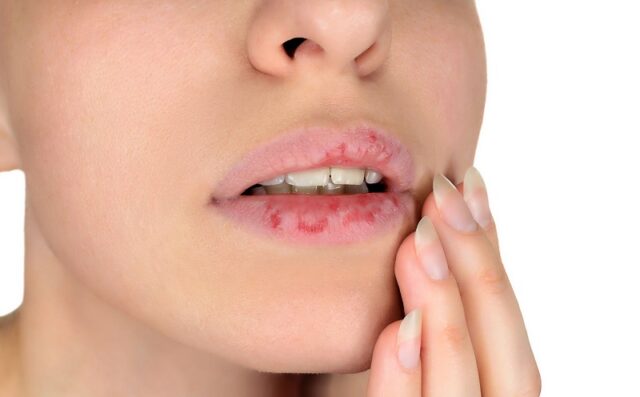If you wake up in the morning with your mouth feeling more parched than the Mojave Desert, you aren’t alone. It’s estimated that 50 million Americans deal with some form of xerostomia (dry mouth) every year, which has been linked to everything from diabetes to certain medications to sleep apnea. This is one of the most common complaints I hear in my practice, so I’m going to give you 8 reasons why you might feel dry mouth when you sleep.
If you snore
Some people with dry mouth snore, and sleep apnea is more common in those with lower salivary flow. Studies have shown that patients who take treatments for dry mouth report less loud snoring. If you’re one of them, talk to your doctor about possible treatments to relieve your symptoms. In addition, keeping dentures properly fitted can help reduce snoring. And if you need a CPAP machine to treat sleep apnea, try not eating anything at least two hours before bedtime and don’t drink anything past your bedtime either; both factors can contribute to drier mouths that might lead to snoring and sleep apnea.
If you wake up with a dry mouth
Over-the-counter (OTC) artificial saliva products, such as Saliva Substitute and Natrasal, can help rehydrate your mouth and may give you a more restful night’s sleep. Sucking on hard candy or a lemon drop lozenge for about an hour before bedtime can also bring about temporary relief of dry mouth, adds Dr. Weintraub. If your dry mouth is due to acid reflux that wakes you up at night: Treating heartburn with antacids or another anti-reflux medication—as well as making sure you don’t eat late at night—could be your best bet in finally sleeping through the night without waking up with a parched mouth.
Because of nasal congestion
Sinus problems can cause a buildup of mucus in your nasal passages, which makes you feel like you’re breathing through a straw. The mucus also dries out your mouth as it comes into contact with air as you breathe; that sensation is then translated to your brain as dry mouth. People who sleep on their back or face tend to experience nasal congestion more frequently than others since it’s harder for nasal secretions to drain when gravity is pulling them downward. If nasal congestion is at fault, try sleeping on your side instead and use a saline solution in each nostril before bed. The saline will break up any dried mucus and keep it from irritating your throat.
Due to medications (antihistamines and painkillers)
Allergy and pain medications can cause dry mouth as a side effect. Drowsiness is also a common issue with these kinds of drugs. Over-the-counter allergy pills may help, but you should talk to your doctor about medical options if you think that could be causing your symptoms. If pain meds are preventing you from sleeping well, don’t take them close to bedtime and make sure to talk to your doctor before changing doses or taking new meds altogether.
GERD Symptoms – What They Mean and How to Treat Them
GERD, or gastroesophageal reflux disease, occurs when acidic stomach juices back up into your esophagus. This may cause a burning sensation and a very unpleasant taste in your mouth. Because of its connection to heartburn, it is often misdiagnosed as heartburn instead of acid reflux. GERD can be treated with over-the-counter antacids, prescription medications and changes in lifestyle that help reduce symptoms and prevent future flare ups. It’s important to see your doctor if you suffer from frequent stomach pains or indigestion on a regular basis since these are signs of GERD or other digestive disorders like ulcers and gastritis which need professional medical attention.
Lack of saliva can be caused by dehydration or eating spicy foods
Dehydration can cause dry mouth by stimulating your body to produce less saliva. Spicy foods have a similar effect, so drinking lots of water during meals is a good way to prevent dry mouth at night. Feeling tired can also lead to a drier mouth—after all, when you’re tuckered out, you may not even want to drink anything! Lastly, certain medications can also reduce your body’s fluid levels. Check with your doctor if you think that might be a problem for you.
Age-related salivary gland dysfunction might be the cause of your dry mouth while sleeping
As we age, our salivary glands become less effective, making it harder to produce saliva. As a result, older adults tend to wake up with dry mouths, and they’re more prone to dental cavities. To reduce mouth dryness while sleeping, keep some water by your bedside. Drinking water while you are asleep will naturally increase your saliva flow when you awaken; as a result, your mouth won’t feel so dry in the morning.
Certain medical conditions can contribute to dry mouth
If you suffer from a condition such as Sjogren’s syndrome, diabetes or fibromyalgia, you might have symptoms of dry mouth or mouth pain. (Your doctor can determine whether these conditions are causing your mouth to feel dry.) Saliva production slows when you sleep: Not only do our bodies secrete less saliva while we’re sleeping than when we’re awake, but we also produce less when we’re sick or run down and not taking in enough nutrients. Alcohol dries out your mouth: Drinking alcohol causes dehydration—and may even cause more temporary discomfort, like a cotton mouth, than an actual hangover.






